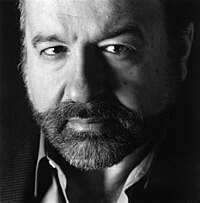Hernando de Soto (economist)
| Hernando de Soto Polar | |
|---|---|
 |
|
| Born |
June 3, 1941 Arequipa, Peru |
| Nationality | Peruvian |
| Field | The economics of the informal sector, research in property rights theory |
| Influences | Milton Friedman |
| Contributions | dead capital |
Hernando de Soto Polar (or Hernando de Soto; born 1941) is a Peruvian economist known for his work on the informal economy and on the importance of business and property rights. He is the president of the Institute for Liberty and Democracy (ILD), located in Lima, Peru.
Hernando de Soto was born on 2 June 1941 in Arequipa, Peru. His father was a Peruvian diplomat . After the 1948 military coup in Peru, his father chose exile in Europe, taking his wife and two young sons with him. De Soto was educated in Switzerland, where he attended the International School of Geneva and then did post-graduate work at the Graduate Institute of International Studies in Geneva. He later worked as an economist, corporate executive and consultant. He returned to Peru at the age of 38. His younger brother Álvaro served in the Peruvian diplomatic corps in Lima, New York City and Geneva and was seconded to United Nations in 1982. He retired from the U.N. in 2007 with the title rank of Assistant Under-Secretary-General; his last position was as the UN Special Coordinator for the Middle East Peace Process. He is well known as an international adviser.
Between 1988 and 1995, he and the Institute for Liberty and Democracy (ILD) were mainly responsible for some four hundred initiatives, laws, and regulations that led to significant changes in Peru's economic system.
In particular, ILD designed the administrative reform of Peru's property system which has given titles to an estimated 1.2 million families and helped some 380,000 firms, which previously operated in the black market, to enter the formal economy. This latter task was accomplished through the elimination of bureaucratic "red-tape" and of restrictive registration, licensing and permit laws, which made the opening of new businesses very time-consuming and costly.
...
Wikipedia
